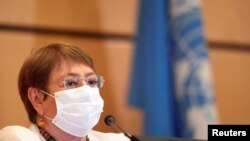The U.N. high commissioner for human rights warns that COVID-19 threatens peace and development around the world. Michelle Bachelet called for action to protect the world’s most vulnerable people at the opening of the 44th regular session of the U.N. Human Rights Council.
The U.N. rights chief says the COVID-19 pandemic has significantly changed the global human rights landscape and profoundly deepened existing inequalities around the world. Michelle Bachelet cites racial and ethnic minorities, and indigenous peoples as among those most victimized by the spread of the deadly ailment. Bachelet added this is particularly true of people of African descent whom, she says, continue to face discrimination and unequal opportunities in many spheres, including education and employment.
Bachelet expresses dismay at reports of increasing stigmatization, discrimination, and hate speech against minorities and migrants in countries such as Sri Lanka, India, Bulgaria, Haiti, Iraq and Pakistan. She calls for urgent action to end unjust and violent actions by law enforcement personnel and for an end to the systemic racial discrimination seen in many nations.
“Discrimination kills. Depriving people of their social and economic rights, kills. And, these deaths and harms damage all of society," said Bachelet. "COVID-19 is like a heat-seeking device that exposes, and is fueled by, systemic failures to uphold human rights. Without rapid and decisive national and international action, the pandemic will put an end to hopes to achieve the Sustainable Development Goals by 2030.”
Bachelet criticizes some countries, including Russia, China, and Egypt, for using COVID-19 as an excuse to crack down on journalists, and on freedom of speech and assembly. She warns the pandemic is deepening local and regional threats to peace. Bachelet also notes the human rights and humanitarian situation in war-torn Yemen and Syria is worsening as the respiratory ailment takes root.
“I am also concerned that the current grave human rights situation in the Sahel region may further deteriorate, as the impact of COVID-19 increases people’s suffering, poverty and grievances," said Bachelet. "Already, armed extremist groups are strengthening their influence over local communities in central and northern Mali, northern Burkina Faso and parts of the Lake Chad basin…In South Sudan, COVID-19 could further heighten the extreme vulnerability of its population.”
The World Health Organization says more than 10 million people globally have been infected with the coronavirus and more than half-a-million others have died. The agency warns the worst is yet to come and says the only way to defeat the pandemic is for nations to work in solidarity.
High Commissioner Bachelet agrees. She says nations must work together for the good of all. She warns any lack of international cooperation and any effort to prioritize profit for personal or political gain over public health will ensure continued spread of the epidemic, hindering economic recovery.




